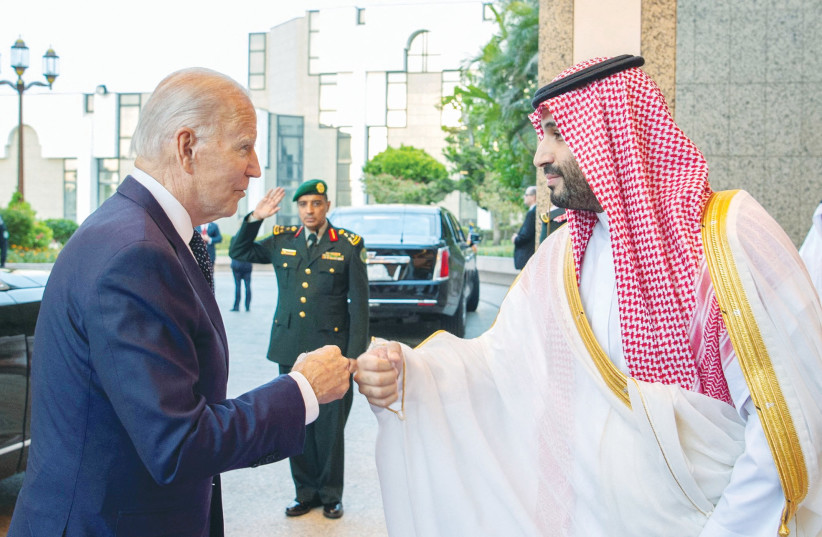In Saudi perception, Israel, Trump misled UAE with Abraham Accords – opinion
The more Israeli officials comment on normalizing relations with Saudi Arabia, the more distant this prospect appears. Israel Prime Minister Benjamin Netanyahu’s remarks suggesting a nearing normalization with Saudi Arabia, voiced on American news networks, didn’t sit well with the Saudis.
Tensions escalated further following my interview with Israeli Foreign Minister Eli Cohen for the Elaph website, during which he asserted that the Palestinian matter shouldn’t impede normalization with Saudi Arabia. This sentiment seemed to stoke Saudi displeasure, prompting a shift from rhetoric to action. Saudi Arabia’s response included the appointment of an ambassador to the Palestinian Authority, who concurrently holds the position of consul in East Jerusalem.
Through their actions, the Saudis sought to communicate a resolute message to Israel: Progress toward normalization hinges on advancing a Palestinian state. This move underscores that aligning with the US president on this issue won’t yield results.
In dialogues with high-ranking members of the Saudi royal household, the Israeli government and its leader were urged to exercise restraint and refrain from speaking on behalf of the Saudis. The message conveyed was that such developments unfold gradually, shwai shwai in Arabic.
What will normalization cost?
The Saudi officials conveyed a clear message: They will not be deceived by Netanyahu and US President Joe Biden when it comes to normalization. They made it clear that they won’t copy the United Arab Emirates’ approach of hastily signing agreements with Israel without ensuring a reciprocated outcome.
 SAUDI CROWN Prince Mohammed bin Salman and US President Joe Biden fist bump upon the latter’s arrival at Al Salman Palace, in Jeddah, last year. (credit: Saudi Royal Court/Reuters)
SAUDI CROWN Prince Mohammed bin Salman and US President Joe Biden fist bump upon the latter’s arrival at Al Salman Palace, in Jeddah, last year. (credit: Saudi Royal Court/Reuters)Within Saudi Arabia, a prevailing sentiment suggests that Israel and then-US President Donald Trump misled the UAE and Bahrain. There’s a growing perception that the commitments laid out in the Abraham Accords went unmet. It’s believed that the United Arab Emirates entered the normalization agreement without substantial gains, neither in terms of the Palestinian situation nor concerning the acquisition of the F-35 stealth fighter aircraft. Simultaneously, considerable criticism from Arab and Muslim quarters has arisen in response to this agreement. As a result, the Emirates have shown a slowdown in their pursuit of substantial gas deals with Israel.
According to the officials I conversed with, a stark contrast emerges. Saudi Arabia’s leadership encompasses not just Arab nations but the entire Muslim world. Consequently, they express an unwavering stance against replicating the UAE’s approach. They articulated that Saudi Arabia wouldn’t consider signing without upfront assurances. These sources emphasized that the UAE found themselves ensnared, acknowledging Israel and the US’s influence over them. Notably, the halting of West Bank annexation by Netanyahu’s government at the time of the Abraham Accords signing remained incomplete, with covert continuation and increased Israeli settlement investments, diverging from prior and current Israeli government assurances, as per Saudi officials’ perspectives.
Furthermore, the sources I engaged with asserted that they firmly communicated to the Emiratis their unwavering stance: Under the current circumstances, Saudi Arabia would not entertain any progress toward normalization with Israel. They also emphasized their disinterest in participating in events orchestrated by the Emiratis, which sought to facilitate meetings between them and Israelis.
In any event, the proclamations from Israel and the USA regarding strides toward peace appear to be at odds with the prevailing reality. While the requisites that the Saudis have stipulated to the White House hold pivotal significance for Saudi Arabia, these requests are unrelated to the assurances that the Saudis are asking of the Israeli government on the matter of advancing a Palestinian state as a condition for normalization talks.
On the flip side, Israel’s leaders appear quick to make statements. Foreign Minister Eli Cohen, as quoted in Elaph, suggests that Netanyahu and Saudi Crown Prince Mohammed bin Salman are on the brink of a historic moment. Yet in a parallel move, the crown prince orders the appointment of an ambassador to the Palestinian Authority for the first time, highlighting a differing perspective on history compared to Netanyahu. The latter grapples with internal challenges and manages a politically divided government. Saudi officials provide insight, expressing reservations about collaborating with a government seen as racist and extreme.
Majdi Halabi is a senior reporter at Elaph.com who specializes in the Arabian Gulf and Israeli affairs.





Comments are closed.